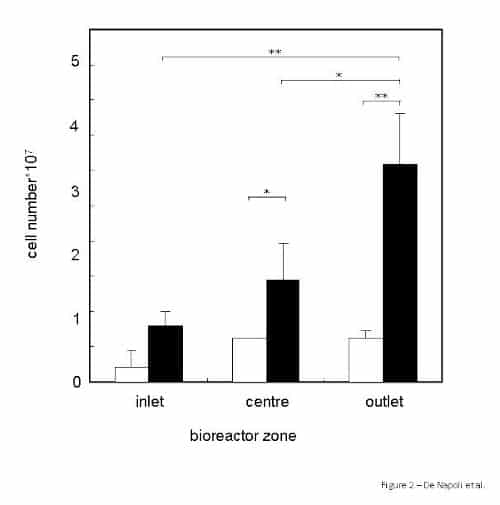The team describes the use of bioreactors for bone tissue engineering applications
Preparation of tissue engineered bone constructs to repair large size defects is limited by the difficult supply of oxygen and nutrients to cells deep inside the constructs. Hollow fibre membrane bioreactors (HFMBs) with medium flowing in membrane lumen have structural and functional analogy with cortical bone. In fact, membranes resemble the Haversian canals and provide for a distributed and delocalized source of nutrients and oxygen to surrounding cells. HFMBs where oxygen and nutrients diffuse to cells have been proposed for bone tissue engineering. HFMBs may also be so operated as to promote spontaneous Starling flows to enhance nutrients transfer to cells. In this study, the effect of low and high Starling flows was investigated on sheep mesenchymal stem cells (shMSC) cultured in the extracapillary space of HFMBs with respect to cell distribution, proliferation and early differentiation. After 12 days of culture, at low Starling flows cells formed thin layers around the membranes uniformly along the bioreactor. At high Starling flows, cells proliferated well and formed thick multilayer aggregates filling the space among membranes at the bioreactor outlet. These results make it possible to postulate the use of HFMBs for obtaining tissue engineered constructs for the repair of large bone defects.
I. De Napoli, S. Scaglione, P.Giannoni, R. Quarto, G. Catapano (2011): “Mesenchymal stem cell culture in convection-enhanced hollow fibre membrane bioreactors for bone tissue engineering” J of Membrane Science
All Resources
Never stop learning!
Check publications from the team, protocols, and useful information to boost your research and get into organ on chip technology!


